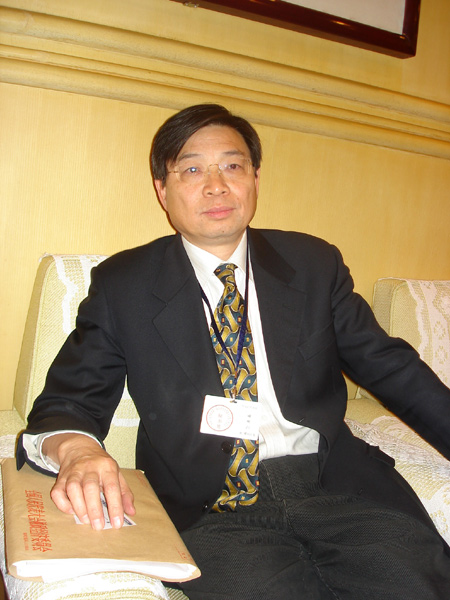| Tools: Save | Print | E-mail | Most Read |
| Standardized Corporate Tax Rates for Level Playing Field |
| Adjust font size: |
The draft Corporate Income Tax Law is now under discussion at the ongoing NPC session, and will be presented for voting on March 16, 2007. A provision of particular interest stipulates the unification or standardization of the rate of taxation at 25 percent, applicable to both domestic and foreign companies. In our special series on the Corporate Income Tax Law, we'll be interviewing NPC deputies, entrepreneurs, industry leaders, and scholars for their take on the proposed unified tax rate, its significance, and potential impact on China's industry and economy. The following is our first interview with Xie Boyang, vice chairman of the All-China Federation of Industry and Commerce (ACFIC). The second interview with a Sichuan deputy, Yang Ming, comes tomorrow. – Editor. A unified corporate income tax rate will create a fair market environment and give a great boost to private enterprises, according to Xie Boyang, vice chairman of the All-China Federation of Industry and Commerce (ACFIC). Xie, a National People's Congress (NPC) deputy of the Heilongjiang delegation, was speaking with china.org.cn on the sidelines of the Fifth Session of the Tenth NPC, which convened in Beijing on March 5.
Currently, the nominal income tax rate for domestic enterprises is 33 percent, while that for foreign-funded enterprises is only 15 percent. China's Ministry of Finance has proposed a unified rate of 25 percent and certain breaks for specific industries and regions. The ACFIC, an organization with over one million member enterprises most of which are private and small and medium-sized enterprises (SMEs), has been pressing for fair treatment for domestic enterprises for a long time. "The preferential tax policy for foreign-funded enterprises contributed to national economic growth and an influx of foreign funds and technologies at the beginning of China's reform and opening-up, but with more Chinese enterprises coming into their own, an equal, transparent and rational market environment has become necessary," Xie said. The tax policy as it stands has resulted in an increase in tax avoidance and evasion tactics. For example, many Chinese companies are registered outside of China, and channel investments into the country in the name of foreign-funded enterprises. Statistics from the Ministry of Commerce show that known tax havens like the British Virgin Islands were ranked among the top 10 countries and regions with Chinese investments in 2006. Xie added: "If the draft law is passed during this session, it will substantially reduce financial burdens on Chinese companies, ease their capital shortage and allow more capital input to production and research and development (R&D)." The actual tax rate of domestic enterprises, according to Xie's calculations, is about 10 percent higher, on average, than their foreign counterparts. This works out to a lot of money, and Xie believes that the proposed revisions will be the equalizer Chinese companies need. He added: "SMEs are comparatively disadvantaged in the market, but they are now the main job providers. For the sake of employment, appropriate taxation policies are necessary for governments." Xie is not too concerned with how foreign investors will react. He believes that China still remains attractive to foreign investors with its huge market and high-quality but cheap labor: "If we ensure that our corporate income tax rate is at least comparable to other countries, the revisions will not have a severe impact on foreign direct investment." Although the proposed 25 percent standardized tax rate would be a great boost to the development of private enterprises, Xie is calling for further tax cuts, which he says is a good way to inject vigor and give impetus to their continued growth. According to the official session schedule, the draft law will be deliberated and discussed before it is submitted for voting on March 16. (China.org.cn by staff reporter Tang Fuchun, March 8, 2007) |
| Tools: Save | Print | E-mail | Most Read |
| Comment |
 |
| Related Stories |
| Product Directory China Search |
Country Search Hot Buys |
